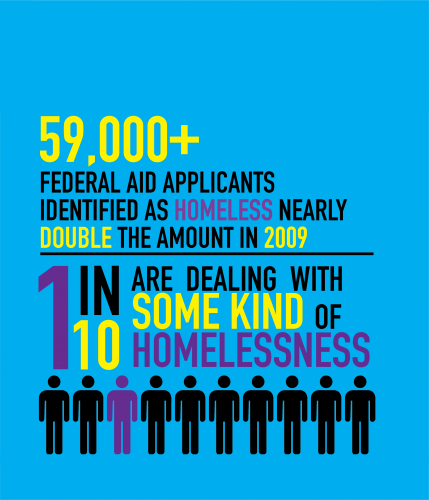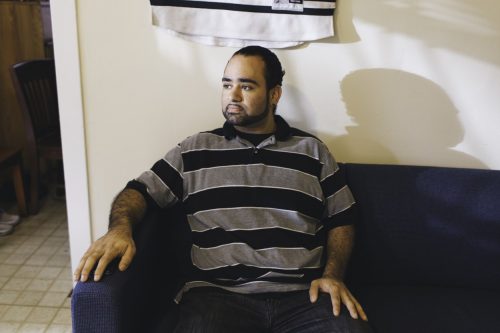The DePaul Dax Host-Home program, a temporary housing program that houses and counsels DePaul University students suffering from housing insecurity, is looking to purchase a two-flat home to house up to ten students. The program hopes to have the home purchased and refurbished by 2018.
The program, which began in 2014, initially aimed to house students in temporary 12-week homes with host families or in individual apartments. However, President and Executive Director of DePaul USA Chuck Levesque said the program realized they had to develop a better functioning model for students.
“It’s a challenge to find host families because it’s a big ask of them to take someone into their house for 12 weeks and sometimes students themselves are a little uneasy going into a stranger’s home,” Levesque said. “Twelve weeks itself can be difficult for finding onward housing for students.”
That’s when the Dax house, was conceptualized. Currently the program is in the process of securing a home located on the West side of Chicago. Levesque said the home would occupy up to ten DePaul students and would require residents to pay minimal rent ranging from $100-150 a month. Students would also sign a lease for a year with priority given to junior and seniors.
“We love the mission and the students at DePaul University so we wanted to start off with just DePaul students, but this is a model that maybe could be replicated at other universities” he said.

Levesque said the university also has given the program a room in a residence hall for a student for the upcoming 17-18 school year.
About 15-20 people have been through the Dax Host-Home program in some capacity either living with a host family, residing in an apartment or seeking counseling.
“Our house will be open to all,” Levesque said. “We want our house to serve DePaul students who have a mission of their own to complete their education and move to the profession of their choosing and this house is a way to make this possible.”
Program coordinator for the Dax program Sister Judy Warmbold said the program has expanded since 2014 with more members of the DePaul community reaching out to her for guidance and asking for ways they can help.
One of the people that reached out to Warmbold was political science professor Phillip Stalley. Stalley and his wife became interested in hosting a student after seeing a flyer at the Ray Meyer fitness center advertising the program to students suffering from housing insecurity.
“I was dismayed when I learned that many DePaul students are facing housing insecurity. I’m fortunate enough to be in a position to help, so I reached out to the Dax program,” Stalley said. “During my ten years at DePaul, I’ve been surrounded by students and colleagues who make community service a central part of their lives and their example certainly influenced me.”
Stalley applied to host a student but has not yet had one placed in his home.
DePaul graduate Tony Romero was the first to benefit from the Dax home host program and sees the impact that it had on his life. Romero graduated in November and is employed at both DePaul USA and H&R Block.
Romero stayed at an apartment that had been donated by a landlord for almost two years but is set to leave at the end of February.
“Being a board member and working here I’m now looking at this organization for different positions,” Romero said. He enjoys remaining active at DePaul USA and accredits them for helping him during a rough time in his life.
“This has been awesome,” Romero said of his job working the business accounts of DePaul USA. “I can honestly say this is the first job I have worked that I’ve used my degree for.”
Romero estimates he worked five to six jobs while a student at DePaul in hopes of gaining more financial security.
“The ultimate goal was building enough funds to be able to have my own apartment. At the end I wanted to have my own secure home.”

Romero said over the course of the last year, DePaul USA has seen an influx of students in the same position he once was in.
“We’ve had students come in asking how they can volunteer for the program,” Romero said.
“There’s been more knowledge in the program and it’s expanded to other universities. We’ve even had calls from other universities asking us ideas about how they can develop their own kind of programs.”
Romero hopes more students realize how prevalent college-aged homelessness is and aims to help more students suffering from housing insecurity.
“Housing insecurity is a major issue and our program makes a big difference with our community, it’s a much bigger issue in our nation,” he said.
According to the U.S. Department of Housing and Urban Development, at least 58,000 college students are homeless. One in ten college students are dealing with some form of housing insecurity.
Warmbold said it’s natural for the university to find housing for their students and let them know of resources and support available.
“To provide a home for someone is very Vincentian,” Warmbold said. “I think we reach out to those in need, those who are on the fringe of society who don’t feel welcome. I think at DePaul we do a lot of that.”

